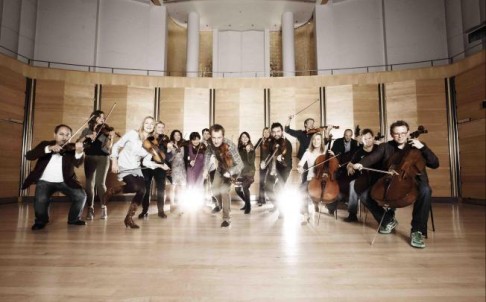
Arts reviews
Following The Truth About Lying in 2010, playwright Wong Wing-sze and director Lee Chun-chow have teamed up again for a biting and hilarious satire on the local arts scene.
HK City Hall Theatre
Reviewed: Mar 4
Following in 2010, playwright Wong Wing-sze and director Lee Chun-chow have teamed up again for a biting and hilarious satire on the local arts scene.
Actor Harold (played by Tang Wai-kit) is suing theatre critic Mia, played by Shaw Mei-kwan (pictured with Tang) for libel after her scathing critique of his latest work, , and called him "a shame on art".
Harold cannot fathom why Mia hates his work so much, especially as it was the only local production to open the city's brand new Grand Theatre and had pulled in a total audience of 35,000 in its 10-show run. Mia sneers at his show's vulgarity; she believes the performance was badly rehearsed and had no artistic merit.
The drama takes an unexpected twist when Mia's two lawyers, David (Michael Ning) and Patrick (Johnny Tan), are drawn into the dispute, especially when the latter begins to develop feelings towards his passionate but emotionally fragile client.
Plays on art versus commerce are nothing new - John Logan's springs to mind - but Wong's story is closer to home and timely. The "Grand Theatre", for instance, can be read as the West Kowloon Cultural District while there is a certain local stage actor-turned-entrepreneur who would fit Harold - down to his red socks - like a glove.
The play takes a swipe at how some decisions in the arts are made in this town by committees that have little, if any, knowledge of the arts.
But Wong doesn't take sides. Through the four characters she deftly presents different views on what "art" is within the context of Hong Kong.
The play climaxes in the out-of-court settlement scene when David abruptly stops Harold and Mia from their lofty debate on artistic ideals and integrity, saying there are people, like him, who just want to pay the money and be entertained: "What f***ing value? No one's going to care!"
Is David the kind of audience who will keep the local arts "business" afloat in the future? The question is left hanging until the end of the show.
Both Tang and Shaw played their roles with conviction while Tan suffered first-night jitters. Ning stole every scene, even with his understated performance.
A short play that is thoughtful, bold and wickedly funny, is another triumph from Wong.

HK City Hall Concert Hall
Reviewed: Mar 15 and 16
The Australian Chamber Orchestra's contribution to this year's Arts Festival comprised two mainstream programmes plus an offbeat experience, , in which live music accompanied, or rather vied with, a film of surf and arid turf.
Friday's straight-up programme was topped and tailed by Haydn and Dvorak, composers who have few rivals in the sublime simplicity of their music; the manner in which violinist/director Richard Tognetti elicited that quality from his ensemble was exemplary.
Written in his Sturm und Drang (Storm and Stress) period, Haydn's Symphony No. 49, , at best wears its minor-key overcoat very lightly. The orchestra coloured the measured opening movement with subtleties in phrasing that were empathetic and never over-disciplined, while the third movement rarely trips as lightly as it did here. The two fast movements might have found more bite, but there was nothing wrong with the vivacious dispatch they were given.
Dvorak's hit the spot better than I can ever remember. Lightness of touch and a matching tone pervaded from start to finish; long, gracefully-spun melodic contours flowed effortlessly; not a single note was interfered with unnecessarily. Exquisite.
Tognetti was the soloist in Mozart's Violin Concerto No. 4. Technically and stylistically superb, in the opening movement his coquettish tone and sense of phrasing were poutingly sensuous at times, the orchestra retreating beautifully to let all this shine through. Changing to a six-string electric violin, Tognetti also fronted Brett Dean's , six bite-sized movements that reflect their imaginative titles, such as and . This was an alluring sound world that turned between suggestions of astral density, haunting solitude, trance-like stasis and plangent whale calls.
The Saturday matinée of was a curious marriage of 80 minutes of live music and a film about surfing on Australia's Ningaloo Reef.
The first 30, however, were devoted more to the desert, human detritus, rotting sheep carcasses, hairy arms and a giant sea creature. Thereafter, identical waves engulfing the same surfer in slow motion unequally partnered the superbly played medley of music, from Bach to Ligeti, grunge and the incredible Mark Atkins on didgeridoo.
